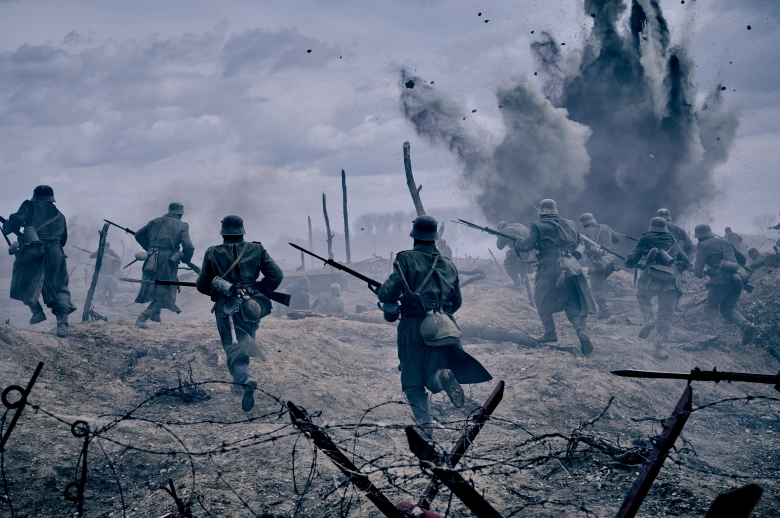World War I ended a little more than a century ago at this point, and it’s never felt like more of a historical blank slate on which to project our fears, our hopes, and our own cultural darkness. World War II still stands as a righteous crusade against evil in the eyes of Western popular culture, but our connection to the original Great War is something much more tenuous, more open to interpretation, and perhaps even intimacy in its storytelling. Perhaps that’s why Sam Mendes’ sweeping epic 1917 and its story of survival against all odds caught on so well with audiences and awards organizations. It was easy to superimpose ourselves onto the battlefield in front of Mendes’ camera, and imagine our own daring rescue missions.
Edward Berger’s All Quiet On The Western Front, the third major cinematic adaptation of Erich Maria Remarque’s legendary novel, is playing with many of the same raw materials as Mendes’ more recent, Britain-focused hit. You’ll find more long takes of futile charges over trenches, more moments of quiet before the inevitable storm of war, and more young actors thrown into the crucible that makes boys into warriors. But in a world that has since been ravaged by a pandemic and a new European war, Berger’s film sidesteps the inevitable comparisons to Mendes (much less Lewis Milestone’s 1930 Best Picture winner) to instead give us something bleaker, more brutal, and perhaps more honest. This is a film about the boys who don’t come home, and its story proves both deeply affecting—and surprisingly timeless.
The fighting in Berger’s film, as in Remarque’s novel, centers on Paul (Felix Kammerer), a young German student who’s swept up in the nationalism of the war movement and enlists for a one-way ticket to the front lines in the fight against France. Paul begins the film bright-eyed, smiling, eager for the mantle of “veteran” and “hero” that will drape his shoulders when he finally comes home. What he doesn’t know is that his uniform was just recently stripped off a corpse and laundered for re-use, that his path to so-called glory lies through miles of mud, and that his band of idealistic friends will not be intact by the end of the war.
After capping off the film’s opening act with a terrifying depiction of Paul’s first brush with combat, Berger leaps forward to the fall of 1919, the final days of the war. Now a hardened soldier with the end of his time on the front in sight, Paul has settled into the mundane, bleary-eyed life of the Great War, while the real battle is fought elsewhere. As a German diplomat (Daniel Bruhl) races against time to forge an armistice, the country’s generals try to keep fighting, because it’s the only thing they know how to do.
This tension between peace and the constant urge to keep pushing at the front forms the emotional and structural backbone of Berger’s narrative, and what’s most striking is how readily he’s able to bring the diplomatic struggles far away from the trenches to bear on Paul and his friends as they grapple with ceaseless artillery barrages and gallons of muddy water. The totality of the consequences springing forth from the decisions of the powerful is never lost on the day-to-day work of the soldiers, and on Paul’s journey as he trudges through grief, blood, and a distant memory of what he once called peace. To underscore those consequences, Berger plays up the indecision of the German leadership, as diplomats argue for the sake of each human life and generals argue for the sake of national pride and bloody legacy. It’s an argument you could see playing out on the front page of a major newspaper any day right now, and it heightens Berger’s timeless points about the futility and false pride of war.
Though he’s certainly not the only bright light in the film’s large ensemble cast, Kammerer must carry much of this narrative tension in his face at all times, and he does a remarkable job of looking both distant and cold in the face of ceaseless tragedy and simultaneously imbuing Paul with a raw sense of humanity. There’s a sense of watching an open wound move through space as he powers through this film, from the fluid one-take battle sequences to the shell-shocked stares he delivers when the explosions die down and the counting of the dead begins. It’s a remarkable, reactive, and very rewarding performance, and it’s backed up by the compositional confidence of his director.
Berger’s All Quiet On The Western Front is a powerful, human odyssey about the cost of endless war and the whims of the powerful, but what lingers afterward is the way its director frames that narrative across the (literal) European landscape. Berger’s battle sequences are memorable, but just as memorable are his moments of quiet punctuation by framing up the silent trees of the Western European forests, the babbling brooks that will flow on no matter how much blood seeps into the waters, the wildlife that will keep fighting its own battles, heedless of the human ones. A shot of a tank emerging from smoke like a monster in a horror film might be followed by a still tableau of a forest canopy, as though God himself is watching from just above those trees, maybe judging the combatants, maybe ignoring them. If the outcome is the same, does it matter?
These are the questions invited, and not always answered, by All Quiet’s elegiac and haunting look at a war almost no one is still alive to remember. Yet what it has left to teach us, and what we carry of it into our own wars, is very much up to us—and it’s the film’s keen awareness of that sense of projection that makes it resonate.
![]()
![]()


